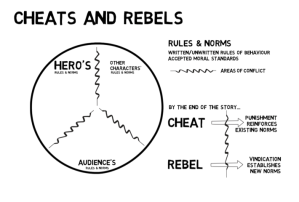Cheats, rebels and rule breakers are as old as storytelling itself: think of Adam and Eve eating the apple, Pandora opening the box or Peter Rabbit disobeying his mother. Christopher Booker goes so far as to say “every time you hear a rule in a story, you know it will be disobeyed. Otherwise there can be no story.” (Seven Basic Plots)
This goes way back to our evolution as social animals. In order to live in groups, we are wired to pay close attention to moral codes, social norms, rules and rule-breakers.

So, how can you use our fascination with cheats and rebels to your advantage? Take the main characters in your story and ask what are the rules or social norms they live by. Work out how they might clash and how one person might be breaking the other’s rules. Now think about your audience and how their rules or norms might differ from the characters in your story.
BUT if you set up a rule breaking situation in your story, you MUST resolve it. Rule breaking is resolved in one of two ways:
- Cheats should be punished. This confirms the existing moral code.
- Rebels should be vindicated. This establishes a new moral code.